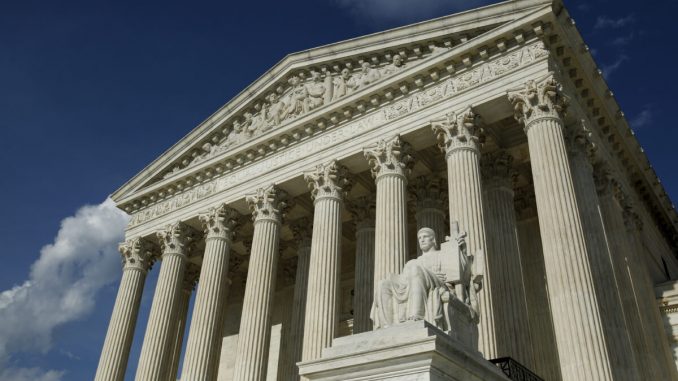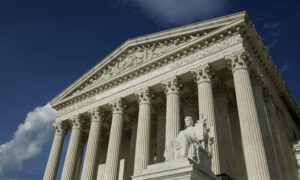

New Hampshire has no right to challenge Massachusetts’ allegedly unconstitutional pandemic-era policy of taxing out-of-state residents who work in their home state for employers located in Massachusetts, the Biden administration told the Supreme Court.
Billions of dollars in income taxes paid by people who worked from home during the pandemic are at stake in this case, and conceivably in other states like New York that tax nonresident income.
The Biden administration was responding after the high court asked for its view of a lawsuit brought by New Hampshire last fall. Invoking the high court’s original jurisdiction to adjudicate disputes between the states, New Hampshire v. Massachusetts, court file no. 22O154, was initiated by a bill of complaint Oct. 19, 2020.
According to New Hampshire, the Massachusetts tax rule goes against New Hampshire’s state sovereignty, its residents’ economic interests, and runs afoul of the U.S. Constitution’s Commerce Clause and the Fourteenth Amendment’s Due Process Clause. New Hampshire asks the court for an injunction preventing Massachusetts from enforcing the rule and requiring it to refund all funds collected under it.
Fourteen states filed a friend-of-the-court brief in support of New Hampshire’s position. Those states are Arkansas, Connecticut, Hawaii, Indiana, Iowa, Kentucky, Louisiana, Missouri, Nebraska, New Jersey, Ohio, Oklahoma, Texas, and Utah.
In the bill of complaint, which the Supreme Court has yet to agree to consider, New Hampshire accuses Massachusetts of “a direct attack on a defining feature of the State of New Hampshire’s sovereignty.”
Acting U.S. Solicitor General Elizabeth Prelogar said New Hampshire lacks a valid complaint.
“Although New Hampshire might prefer that its residents not pay personal income taxes to any government, an independent tax obligation falling on a state’s residents generally is not an injury to that state’s own sovereign prerogatives,” said Prelogar, the administration’s top Supreme Court attorney.
“Individuals often have tax obligations to multiple sovereigns,” Prelogar wrote in a friend-of-the-court brief. “New Hampshire has not identified any case suggesting that one State’s taxation of employees who reside in another State violates the sovereign interests of the other State.”
New Hampshire’s contention “that it has suffered a serious violation of its sovereignty” has “no limiting principle” and could lead to more states suing in the Supreme Court to defend their sovereignty, she claimed.
Instead, New Hampshire should sue in the Massachusetts court system, she wrote.
The dispute arises out of a process that began when Massachusetts issued an emergency order retroactively effective March 10, 2020, near the beginning of the pandemic. Concerned about losing income tax revenue from the estimated 100,000 New Hampshire residents who before the pandemic commuted to work in Massachusetts, the Bay State issued an emergency tax rule requiring those individuals still employed by Massachusetts companies to continue paying income tax to Massachusetts even though they no longer physically worked there. The temporary rule was subsequently extended indefinitely.
This move angered New Hampshire residents and officials. Unlike its high-tax neighbor to the south, the Granite State has no state income or sales tax as part of an intentional strategy to remain economically competitive with other states.
The lawsuit by New Hampshire was launched “to rectify” Massachusetts’ “unconstitutional, extraterritorial conduct, which ignores deliberate and unique policy choices that are solely New Hampshire’s to make,” according to court papers.
Attorney Joseph D. Henchman, who filed a friend-of-the-court brief on behalf of the National Taxpayers Union Foundation, Americans for Tax Reform, and 15 other groups, told The Epoch Times that Prelogar’s position was not unexpected.
“Part of the Solicitor General’s job is to advance federal interests, and it’s not surprising the Biden Administration doesn’t see interstate tax policy as an urgent priority,” he said via email.
“Justices [Clarence] Thomas and [Samuel] Alito, like [former] Justice [John Paul] Stevens before them, believe that the Supreme Court should not be able to turn down cases between states (most recently last month in Texas v. California, 141 S.Ct. 1469). So we shall see if enough additional justices want to resolve this case or instead consign thousands of individual taxpayers to deal with an unfriendly Massachusetts forum.”
Paul Craney of the Mass Fiscal Alliance, told Commonwealth magazine Prelogar’s brief came as no surprise.
“President [Joe] Biden’s administration has continually advocated for new taxes, higher taxes, and more complex taxes. It comes as no surprise that the President is now standing shoulder to shoulder with [Massachusetts] Governor [Charlie] Baker in their quest to tax workers who have virtually no ties to the state,” Craney said.





Be the first to comment